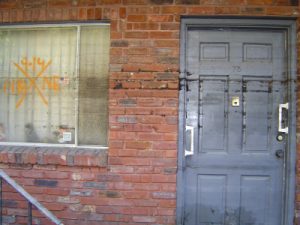Four years. It’s a presidential term; it’s the length of a high school or college education.
It’s also the amount of time that has passed now since Hurricane Katrina swept across the Gulf Coast and devastated the city of New Orleans, driving thousands of citizens from their homes. Many still have not been able to return.
I spent four years of my life in New Orleans. They were four years that shaped me into the person that I am today. I learned about racism and I learned about jazz. I learned about poverty and class divisions, and I learned about real friendship. I learned what it was like to really fear your home being wiped out by a hurricane, and I learned what it was like to struggle to pay rent. I haven’t been back, but the city remains in my heart.
After the storm, many Americans opened their hearts (and in some cases, their homes) to New Orleans. We have a new president now, perhaps partly because Katrina exposed George W. Bush’s basic incompetence and lack of empathy. Those of us who have been paying attention have gotten quite an education from the government’s handling of Katrina, watching the initial fumble grow into four years of neglect.
According to James Perry, Executive Director of the Greater New Orleans Fair Housing Action Center and candidate for mayor of New Orleans, the Obama administration has made an effort to do better by New Orleans. He notes, though, that, “The thing that’s difficult about that for Louisianans and New Orleanians is that four years out, we’re tired of waiting.”

And New Orleans is still waiting. The levees are just now testing at pre-Katrina strength—the same levees that failed the city under only an indirect hit from the storm. Much stronger protection is needed, not just in the form of levees, but the wetlands that would have provided a barrier to a storm surge had they not been devastated years before the hurricane came. Perry says, “Not having proper levee protection frankly makes a lot of people afraid for the future of the city.”
The lack of affordable housing has kept many New Orleanians away and keeps others struggling. Neil Abramson, Louisiana State Representative from New Orleans, notes “We recently have had an increased, visible homeless population. The federal government has sent us ‘homeless vouchers’ but they are only available 5 per week.” He also says that with the August 31 expiration of federal housing vouchers, “we could have a lot more homeless people as those people receiving housing under that program will lose it.”
The Katrina cottages, small permanent houses that could serve as a base for rebuilding lost homes, have been stalled for years now. Perry says, “I’m tempted to say ‘What cottage program?’ It’s a testament to the way that government hasn’t performed after the storm.” Abramson says that $74.5 million in federal money was allotted to the program, which called for the building of 500 approximately 900 to 1300 square foot model homes as an alternative to FEMA trailers.
Only one “exemplar” trailer has been built so far, according to Abramson, who is holding legislative hearings on the subject. He reports that now two-thirds of the cottages are under construction with completion dates staggered over the next 8 months. He agrees with Perry though that, “In sum, the cottage itself might turn out to be a good product, but the State has completely botched the ‘process.’ Four years post-Katrina is absurd.”
Part of the appeal of New Orleans for years, the draw for creative people from around the world, was its incredibly cheap rent. In 2000, only 46% of the city owned their own home, yet rental apartments and public housing were affordable even for the city’s low income (the median for a household in 2000 was $27,000). But according to Perry, Katrina wiped out 80,000 units of housing, and the department of Housing and Urban Development, under Bush, demolished 4600 more, bulldozing public housing that was home to the city’s poorest citizens.

Section 8 housing vouchers are another center of controversy—Perry notes that a large majority of landlords won’t accept the vouchers, and complain of the failures of the housing authority. This week, the head of the Section 8 program stepped down amid allegations that he was using the vouchers himself despite his $100,000 salary.
Rents are not as steep as they were in the immediate aftermath of the hurricane, when Perry says they were higher than New York City’s, but they remain 40% higher than before the storm. Needless to say, in a town that survives on tourist dollars, incomes haven’t kept up, and the recession certainly hasn’t helped.
The city’s hospitals continue to suffer—Abramson notes that Governor Bobby Jindal used his line-item veto to cut funding for the New Orleans Adolescent Hospital, the only state-run mental health facility. “That will cause a crucial lost of mental health services, potentially increase crime, likely cause jail overcrowding, and possibly hurt our private and non-profit hospitals who might be forced to treat these patients without compensation,” he says.
Charity Hospital, one of the nation’s oldest public aid hospitals, relied on for care by thousands of New Orleans residents, remains closed after the storm in another blow to the low-income citizens of the city.
After Katrina, Barbara Bush famously said, “And so many of the people in the arena here, you know, were underprivileged anyway, so this–this is working very well for them.” It is hard to see, four years in, how well things have worked out for people who lost everything they could rely on. Instead, it often appears as though the government is conspiring against them, and right-wing radio hosts can barely hide their glee. Neil Boortz sneered at them on Twitter, referring to “the debris that Katrina chased out.”
The thing that’s always kept New Orleans going is its music; it has always been the life and soul of the city. Ron Rona, of the band the New Orleans Bingo! Show, says that the music scene is undergoing a resurgence. He credits the rise of social networking and Internet marketing–“In some ways, it’s kind of leveled the playing field as far as promotion goes to an internet savvy set of hungry music fans.”
Music education has always been a strong part of the city as well—it has kept the jazz scene vital and strong, passing down the traditions and bringing new blood in to innovate. Rona points to new programs that have sprung up in the past few years, including the Roots of Music Foundation, founded by Derrick Tabb, snare drummer in the world-famous Rebirth Brass Band.
“What’s missing?” Rona asks. “The refocus of the national spotlight on one of the most unique and vibrant musical heritages in the world. And not just because we went through a storm.”
Four years is a long time and much has changed. The recession that has spread across the world has forced people to look after themselves and cut back not just on giving but on travel and entertainment, the very industries that keep New Orleans going. It is easy to forget the tragedy that befell New Orleans, or to assume that no news is good news, that the government is working as it should to rebuild the city, or that private industry and charitable organizations have filled in the gaps.
Abramson, Perry, Rona and thousands of New Orleanians like them are working hard to rebuild their city from within, but without support from the federal government, they will continue to struggle. Hurricane Katrina’s devastation defined the end of the Bush era; helping to rebuild a thriving New Orleans can help define the Obama years.

I think the devastation is really sad, and also the fact that the government is not helping the way it should be. But you have to admit that a lot of the people who died or suffered should have just packed up and left and would have been OK. I’m not talking about the old grannies obvs, but some of the other people.
Dina, you’re talking like an idiot. Those people who “should have left”? They couldn’t. They had no vehicles. They had no money. They couldn’t catch the bus to get out of town, because the buses stopped running well before Katrina hit. They stayed because they literally could not get out. The government knew this was going to happen. They knew that 100K New Orleanians had NO WAY of getting out and what did they do? Nothing. They said “sorry, we won’t help you”. They had no shelters open. They had no place for people to go. They abandoned those people, knowing full-well they were trapped. I’m lucky. I have a car, I have money to afford fuel. I have family upstate that will take me in. But for many, many, many people down here that’s not true. Many, many, many people down here have never left the city in their entire lives. They don’t drive. They work low wage jobs and barely get by. Katrina hit at the end of the month, when the scarce funds they did have were already gone. Do you think anyone WANTED to sit through a (at that time) Cat 4/5 storm? Those people who “should have left” are no different than you or me, we’re just LUCKIER than they are, that’s all. The buses stopped running, the planes stopped flying, they had no car, no money, no shelter to go to. So stop the damned victim blaming. They didn’t ‘get themselves killed’. They were abandoned because they were seen as expendable. And they continue to be abandoned by a government/culture that doesn’t value them, doesn’t want them and probably wishes they had all drowned.
Dina, are you the same vicious, horrible person who says on NA’s blog that Russian women are prostitutes and women harassed in Jordan are asking for it? You sure sound like it. Please stop with the vile, bigoted, victim-blaming comments.
i have to agree with the last two posts on this one whats up with people blaming the victims? it’s like every time there is some thing terrible(katrina or the LA roits)that happens to the black commuity they must be the cause of it like the way pat robberts(or who ever it was)said that the hurricanes hit for ressons of sin?
devastating
i am speechless
Dina
you are wrong and a horrible bitch if you blame the victims